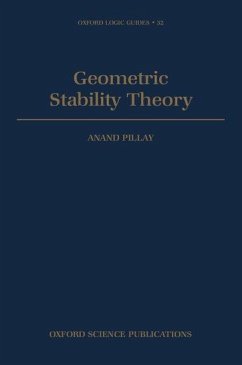This book is an exposition of the central features of one of the most developed and sophisticated parts of modern model theory. Geometric stability theory studies the fine structure of models of stable theories. An ever present theme is the existence and structure of definable groups. Fundamental applications to a classification theory are included in the text. Recent years have seen other surprising applications to, among other things, diophantine geometry. This book will be invaluable to anyone interested in modern model theory, such as working model theorists and graduate students in logic.
This book gives an account of the fundamental results in geometric stability theory, a subject that has grown out of categoricity and classification theory. This approach studies the fine structure of models of stable theories, using the geometry of forking; this often achieves global results relevant to classification theory. Topics range from Zilber-Cherlin classification of infinite locally finite homogenous geometries, to regular types, their geometries, and their role in superstable theories. The structure and existence of definable groups is featured prominently, as is work by Hrushovski. The book is unique in the range and depth of material covered and will be invaluable to anyone interested in modern model theory.
Hinweis: Dieser Artikel kann nur an eine deutsche Lieferadresse ausgeliefert werden.
This book gives an account of the fundamental results in geometric stability theory, a subject that has grown out of categoricity and classification theory. This approach studies the fine structure of models of stable theories, using the geometry of forking; this often achieves global results relevant to classification theory. Topics range from Zilber-Cherlin classification of infinite locally finite homogenous geometries, to regular types, their geometries, and their role in superstable theories. The structure and existence of definable groups is featured prominently, as is work by Hrushovski. The book is unique in the range and depth of material covered and will be invaluable to anyone interested in modern model theory.
Hinweis: Dieser Artikel kann nur an eine deutsche Lieferadresse ausgeliefert werden.








